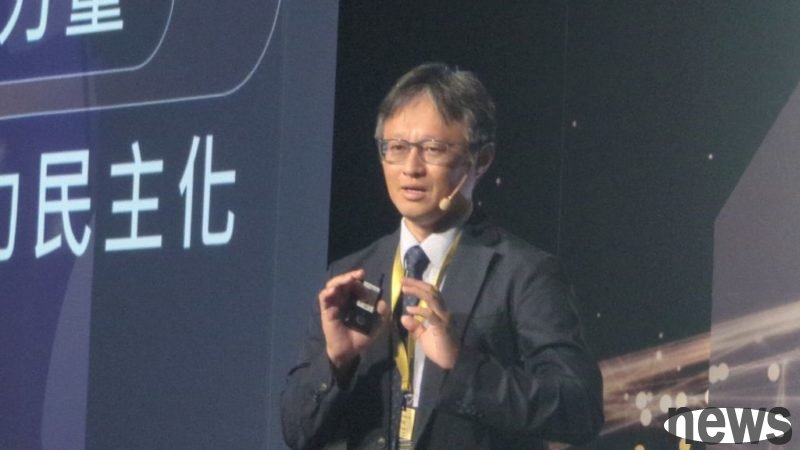
In response to the recent global AI hot trend continues to prolong, Pan Jiancheng, executive director of the fast memory control chip factory group, said that in terms of challenges and opportunities for AI popularization, the company's latest strategy in the promotion of AI PC platform is to reduce costs, expand applications, and cultivate talents, so that AI can truly enter the daily life and make Taiwan stable in the new wave of industry links.
Pan Jiancheng said during the "2025 AMD AI SOLUTIONS DAY" special lecture held on the 4th that many companies still have misunderstandings about AI. First of all, many business owners mistakenly believe that AI can directly replace human decisions, but in fact, AI can only help and must be guided and trained by humans to achieve maximum value. Pan Jiancheng's metaphor: Introducing AI is like hiring a doctorate who just graduated from the industry. You must first be familiar with the corporate culture and processes in order to truly contribute to the director.
Secondly, it lies in the enterprise's application level error in AI. Many people look forward to AI solving high-level decision-making problems. But in fact, what AI can realize the most immediately benefits is the repetitive, low-level literary work that takes up a lot of time in the office's daily life. Through AI processing these tasks, more manpower can be released and high-value activities can be invested.
Finally, the key question is cost. The group said bluntly that AI is really expensive, and the main reason is that the memory is insufficient, rather than a simple computing power. The current operation of large language models is often limited by the capacity of GPU and DRAM, resulting in high overall investment costs. Especially when the memory market is tightly supply and demand, how to reduce the door becomes a decisive factor in the popularization of AI.
When discussing the challenge of popularizing AI, Pan Jiancheng believes that the focus is on the development of AI PC. Pan Jiancheng has high hopes for this after his business two years ago, but has not yet seen explosive growth. The main reasons are the high hardware costs and insufficient application scenarios. AI PCs need to be additionally configured with GPUs, NPUs and memory with larger capacity, resulting in a dilemma of inaccurate prices. Without sufficient market size, application ecosystems cannot be formed. However, to promote the popularization of AI PCs, the key is to the price of the hardware platform. Just as smart phones ignited the application ecosystem in 2007 due to the iPhone's world, AI PCs also need an affordable, fast-introduction solution to drive the market.
Regarding the high-cost problem, Pan Jiancheng pointed out the group link to propose the Flash Management (flash memory management) solution, which transforms part of the storage space into cache memory required for AI computing through special SSD design. This technology does not require a substantial change in the hardware architecture, but only changes in storage devices, which can improve AI recommendation performance and significantly reduce the dependence on high-priced DRAM. Moreover, with the popularization of this solution, more than 300 million PCs shipped worldwide each year can be directly converted into AI PCs, bringing the ecological benefits of the era of smart phones. This will not only stimulate the development of new applications, but will also promote the growth of Taiwan’s ODM, OEM and component suppliers.
In addition, Pan Jiancheng also emphasized that the shortcomings of AI development talents have become the industry bottleneck. The reason is that high-priced GPU resources are mostly concentrated in research units and large enterprises, and students generally lack actual operational experience. To solve this problem, the group promotes AI Training PC planning and provides a relatively low-cost workstation platform to allow college students to perform manual work in the campus, thereby giving birth to more developers. As of now, 18 Taiwan universities have introduced the platform, and the group hopes to form a positive cycle of talent cultivation and industry application, so that AI innovation can be extended from the campus to the market.
Finally, Pan Jiancheng also reminded that if enterprises rely entirely on cloud deployment in AI, they will be a pure "rentaler" and it will be difficult to pay large fees for a long time to master core technology. Therefore, the best model in the future is a hybrid use of cloud and ground. The cloud side provides real-time computing power, and the ground side can handle private or cost-sensitive applications. With the popularity of AI PCs, more companies will transform from a single user to a service provider to create new business models.
In addition, because Taiwan plays a key role in the global information and communications industry chain, in the future, under the wave of AI, Taiwan will not only remain the first in hardware manufacturing, but also have the opportunity to establish advantages in software and application ecosystems. From talent training and hardware costs to application innovation, Taiwan has a complete supply chain. If AI PC popularization machines can be grasped, it will be able to occupy a dominant position in the new wave of AI industry revolution in the world.
Next:Zhisheng, Junhao and Junhua G2C have become advanced packaging alliances! Dong Zuoliang Youwen: CoPoS research and development will make a fortune